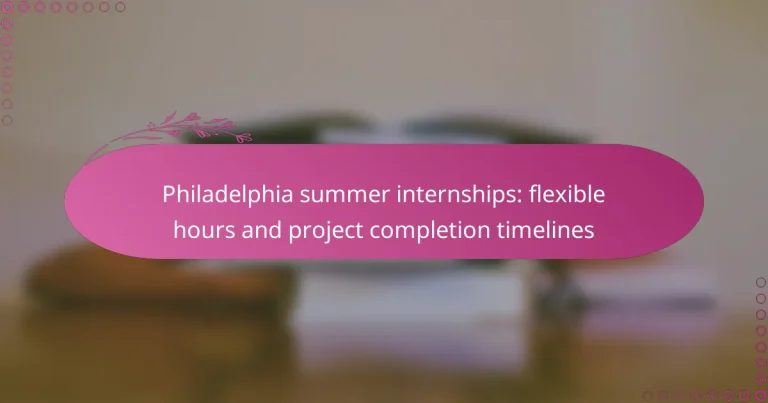

What are Philadelphia summer internships?
Philadelphia summer internships are temporary work opportunities offered during the summer months. They provide students and recent graduates with practical experience in various fields. These internships often involve project-based work, allowing interns to apply their academic knowledge. Commitment expectations usually range from part-time to full-time hours. Many internships in Philadelphia are unpaid or offer stipends. They can be found in sectors like business, healthcare, and technology. Interns gain valuable skills and networking opportunities through these experiences. Statistics show that internships can significantly enhance employability after graduation.
How do project-based timelines influence Philadelphia summer internships?
Project-based timelines significantly influence Philadelphia summer internships by establishing clear expectations for both interns and employers. These timelines dictate the duration and scope of projects, affecting the recruitment process. Interns are often selected based on their availability to meet project deadlines. Employers benefit from defined timelines as they can allocate resources effectively. Additionally, these timelines help in measuring intern performance against specific milestones. Research indicates that structured timelines enhance productivity and accountability. A study by the National Association of Colleges and Employers highlights that internships with clear project goals lead to higher satisfaction rates among participants. Thus, project-based timelines play a crucial role in shaping the internship experience in Philadelphia.
What is the typical duration of project-based internships in Philadelphia?
The typical duration of project-based internships in Philadelphia is usually between 10 to 12 weeks. These internships often align with the summer academic break. Many organizations offer full-time positions during this period. Interns typically work around 30 to 40 hours per week. This timeframe allows interns to engage deeply with projects. It also provides sufficient time for skill development and networking. Various industries in Philadelphia follow this standard duration. This consistency helps interns plan their summer effectively.
How are project timelines structured in these internships?
Project timelines in these internships are structured around specific phases of project development. Typically, they include initiation, planning, execution, monitoring, and closure. Each phase has defined milestones and deadlines. Interns are expected to adhere to these timelines to ensure project completion. Regular check-ins and progress reports are often scheduled to assess adherence. This structure provides a clear framework for interns to manage their tasks effectively. Additionally, it aligns with organizational goals and project objectives. Such timelines help interns develop time management skills and accountability.
What are the commitment expectations for interns in Philadelphia?
Interns in Philadelphia are generally expected to commit to 10 to 40 hours per week. This varies based on the specific internship and organization. Many internships last for a duration of 8 to 12 weeks during the summer. Some may require a full-time commitment, while others offer part-time options. Employers often seek interns who can maintain consistent attendance. This consistency helps ensure project completion and team collaboration. It is common for internships to have flexible schedules to accommodate academic commitments. Overall, commitment expectations are designed to align with both the intern’s availability and the organization’s needs.
How many hours per week are interns expected to commit?
Interns are typically expected to commit 20 to 40 hours per week. This range allows for flexibility depending on the specific internship program and its requirements. Many organizations in Philadelphia offer full-time internships that require 40 hours weekly. Part-time internships may require around 20 hours per week. The specific commitment can vary based on the project’s demands and the intern’s availability. Understanding the expected hours is crucial for effective time management and project completion.
What factors influence the level of commitment required?
The level of commitment required for Philadelphia summer internships is influenced by project complexity, duration, and expectations. Complex projects typically demand more time and effort from interns. The duration of the internship also impacts commitment; longer internships often require greater dedication. Additionally, the specific expectations set by the organization shape the level of commitment needed. Organizations may have different standards for deliverables and performance, affecting intern engagement. For example, internships with clear, structured goals may lead to higher commitment levels. Conversely, internships lacking defined objectives may result in varying degrees of commitment.

What types of projects are included in Philadelphia summer internships?
Philadelphia summer internships typically include community service projects, research initiatives, and corporate assignments. Community service projects focus on local engagement and social impact. Research initiatives often involve data analysis and field studies. Corporate assignments provide hands-on experience in various industries. Interns may work on team-based projects or individual tasks. These projects aim to develop skills and enhance professional growth. Many internships also offer networking opportunities with industry professionals. Overall, the projects align with the intern’s field of study and career goals.
How do project types vary across different industries?
Project types vary significantly across different industries. In technology, projects often focus on software development and system integration. Healthcare projects may involve clinical trials or patient care improvements. Construction projects typically center on building and infrastructure development. Marketing projects often emphasize brand campaigns and market research. Each industry has unique requirements and outcomes. For instance, technology projects prioritize innovation and efficiency. Healthcare projects focus on patient outcomes and regulatory compliance. Construction projects are bound by safety standards and timelines. Marketing projects aim for audience engagement and sales growth. These variations reflect the specific goals and challenges inherent to each industry.
What are common project themes in nonprofit internships?
Common project themes in nonprofit internships include community engagement, fundraising initiatives, and program development. Community engagement projects often focus on outreach and building relationships with local populations. Fundraising initiatives typically involve planning events or campaigns to raise financial support. Program development projects aim to create or improve services offered by the nonprofit. Interns may also work on advocacy efforts to promote social issues. Research shows that these themes help interns gain practical skills while contributing to meaningful causes.
How do for-profit internships differ in project focus?
For-profit internships typically focus on specific business objectives and revenue generation. These internships often involve projects that align closely with company goals. Interns may work on tasks that directly impact the bottom line, such as marketing campaigns or product development. In contrast, non-profit internships might emphasize community service or educational outcomes. A study by the National Association of Colleges and Employers (NACE) indicates that for-profit internships provide hands-on experience in a competitive environment. This experience can enhance job readiness and employability.
What skills can interns expect to develop through these projects?
Interns can expect to develop a variety of skills through project-based internships. These skills include project management, which involves planning, executing, and overseeing tasks to meet deadlines. Communication skills are enhanced as interns collaborate with team members and present their findings. Technical skills may also be developed, depending on the project focus, such as data analysis or software proficiency. Problem-solving abilities are sharpened as interns tackle real-world challenges. Additionally, interns gain industry-specific knowledge relevant to their field of interest. Networking skills improve through interactions with professionals and peers. These skills are critical for future employment opportunities and career advancement.
Which technical skills are commonly enhanced in project-based internships?
Project-based internships commonly enhance skills such as data analysis, software development, and project management. Interns often learn programming languages like Python or Java. They also gain experience with data visualization tools. Collaboration tools and methodologies like Agile are frequently utilized. Additionally, technical writing skills improve as interns document their projects. These skills are essential in the competitive job market. Employers value candidates with practical, hands-on experience in these areas.
How do internships foster soft skills through project work?
Internships foster soft skills through project work by providing real-world experience in a collaborative environment. Participants engage in tasks that require communication, teamwork, and problem-solving. These projects often simulate workplace scenarios, enhancing adaptability and critical thinking. Interns receive feedback from supervisors, which aids in personal and professional growth. Research indicates that 70% of learning in the workplace occurs through experiential activities, such as project work. This hands-on approach allows interns to practice soft skills in context, making them more effective in future roles. Additionally, collaboration on projects builds interpersonal skills and emotional intelligence. Overall, internships serve as a vital platform for developing essential soft skills.

What resources are available for finding Philadelphia summer internships?
The resources available for finding Philadelphia summer internships include online job boards, university career centers, and local networking events. Websites like Handshake, Indeed, and LinkedIn list numerous internships specifically in Philadelphia. University career centers often provide tailored resources and support for students seeking internships. Local networking events, such as career fairs and industry meetups, allow direct connections with employers. Additionally, organizations like the Greater Philadelphia Chamber of Commerce offer internship resources and connections to local businesses. These platforms and events facilitate access to a wide range of internship opportunities in the city.
How can students effectively search for internships in Philadelphia?
Students can effectively search for internships in Philadelphia by utilizing multiple strategies. First, they should leverage online job platforms like LinkedIn, Indeed, and Glassdoor. These platforms list a variety of internships available in the city. Second, students can visit local university career centers for resources and networking opportunities. Many universities in Philadelphia have established connections with local businesses. Third, attending career fairs can provide direct access to potential employers. These events often feature companies specifically looking for interns. Fourth, students should reach out to their networks, including professors and alumni, for leads on internships. Networking can often lead to unlisted opportunities. Finally, students can research companies in their field of interest and apply directly through their websites. This proactive approach increases the chances of finding suitable internships.
What online platforms are most useful for internship searches?
LinkedIn, Indeed, and Glassdoor are the most useful online platforms for internship searches. LinkedIn connects users with professionals and companies, offering job listings and networking opportunities. Indeed aggregates job postings from various sources, making it easy to find internships. Glassdoor provides insights into company culture and salary information, aiding informed decisions. Other platforms include Internships.com and WayUp, which specialize in internship listings. These platforms are widely recognized and frequently used by students seeking internships.
How can networking enhance internship opportunities?
Networking can significantly enhance internship opportunities. It allows individuals to connect with industry professionals. These connections can lead to referrals and recommendations. Referrals often result in increased chances of securing internships. Networking events provide access to potential employers. Engaging with professionals can reveal unadvertised internship openings. According to a survey by LinkedIn, 85% of jobs are filled through networking. This statistic highlights the importance of building professional relationships. Networking also helps in gaining insights about specific industries. These insights can guide internship applications and interviews.
What tips can help interns succeed in their summer projects?
Interns can succeed in their summer projects by setting clear goals. Establish specific, measurable objectives to guide your work. Regularly communicate with your supervisor to ensure alignment. Seek feedback frequently to improve your performance. Actively engage with your team to build relationships and network. Manage your time effectively by prioritizing tasks. Document your progress to showcase your contributions. Finally, maintain a positive attitude to foster a productive work environment. These strategies enhance learning and professional development during internships.
Philadelphia summer internships are temporary work opportunities designed for students and recent graduates to gain practical experience in various fields during the summer months. This article explores key aspects of these internships, including project-based timelines that establish clear expectations for both interns and employers, commitment expectations ranging from part-time to full-time hours, and the types of projects typically undertaken across different industries. It also highlights the skills interns can develop, resources available for finding internships, and strategies for success in summer projects, providing a comprehensive overview of the internship landscape in Philadelphia.






